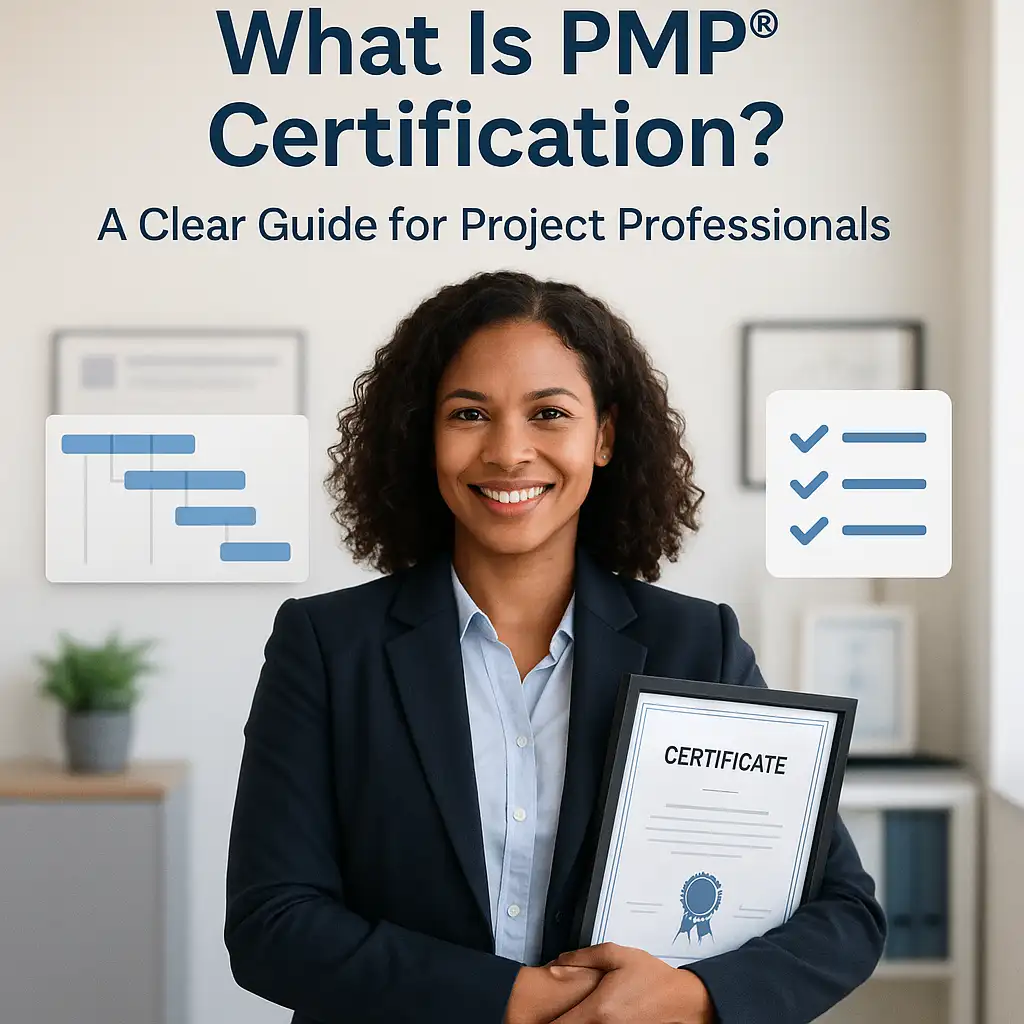What Is PMP® Certification? A Clear Guide for Project Professionals
Author: Alvin Villanueva, PMP®; Editor: Geram Lompon; Reviewed by: Grace Payumo, PMP®
You’ve taken on the work, led the meetings, and delivered tangible results, but the title, the structure, and the recognition still haven’t followed. You know you’re doing more than just managing tasks. You’re ready to lead projects that align with strategy and to prove you can.
This guide explains what PMP® certification truly means, the credibility behind the title, the value it delivers, and how it aligns with PMI’s global standards. You’ll walk away with clarity, confidence, and a more straightforward path to becoming the kind of project leader teams trust and employers rely on.
What Is PMP Certification?
The
Whether you work in construction, tech, healthcare, or finance, a PMP certification shows the world that you know how to manage complexity, deliver value, and lead with purpose (Project Management Institute, 2024).
Unlike many certificates that focus solely on theory or specific methodologies, the PMP certification demonstrates that you can apply
Earning the PMI’s PMP certification signals that you’re more than capable of managing budgets and timelines. You’re ready to align projects with business goals, anticipate risks, and lead people through change. It’s a mark of trust for PMP certification holders, built on credibility and experience.
PMP Certification Requirements: What You Need to Qualify
To apply for the PMP exam, you’ll need to meet a few key requirements, including the necessary hours of
If you hold a four-year degree, you’ll need:
- 36 months of experience leading or directing projects
- 35 hours of
project management education or a valid CAPM® certification
If you have an associate’s degree, a high school diploma, or a global equivalent, you’ll need:
- 60 months of project leadership experience
- 35 hours of formal
project management education
That last requirement, the 35 contact hours, is easier to meet than most expect. Courses from ROSEMET, Udemy PMP Prep, or PMI’s authorized training partners’ offerings can help you fulfill them on time and at your own pace (ROSEMET LLC, 2025; PMI, 2024).
PMI doesn’t require a specific job title. What matters is that you’ve led project work in a business environment, assigned tasks, managed timelines, influenced teams, or taken accountability for outcomes. You’re already on the path if that sounds like your daily life.
What PMP Certification Exam Proves — and Who It’s Built For
Getting certified doesn’t just show that you passed an exam; it shows that you know how to lead. It proves that you can manage shifting priorities, make clear decisions under pressure, and create outcomes that matter to your stakeholders.
You might be an engineer managing site progress, a systems analyst running deployments, or a team lead juggling client priorities and deliverables. PMP certification gives structure to what you’re already doing and credibility to do it fully prepared with the right study materials, clarity, and career momentum.
It signals that you’ve been tested on definitions, decision-making, and practical judgment. Employers see PMP as proof that you’re an experienced project manager and not guessing. You’re guiding.
How to Get PMP Certification: Your 4-Step Guide
If you’re wondering how to get PMP certification, you’re not alone. The application process sounds complex from a distance, but once you break it down, it becomes clear and doable.
- Review the Requirements
Confirm which eligibility path matches your background and assess your project experience. - Complete 35 Hours of
Project Management Education
To meet this requirement, choose a flexible, self-paced training program like the ROSEMET PMP Course Bundle (ROSEMET LLC, 2025). - Apply Through PMI’s Online Portal
Create your profile at PMI.org and submit your education and experience for approval (Project Management Institute, 2023). - Schedule and Take the Exam
Once approved, choose an exam date and location that works for you. Start your PMP Exam preparation. Take time to study, practice with mock exams, and build your confidence.
How Long Does It Take to Get PMP Certification?
The time it takes depends on how much experience you already have and how consistent your study habits are.
- Weeks 1–2: Review eligibility and choose your course
- Weeks 3–6: Complete training and study core topics
- Weeks 7–8: Take practice exams and schedule your test
Most professionals complete the process in 8 to 12 weeks. Some fast-track it in 4 to 6 weeks, while others take 4 to 6 months if they balance full-time work. The key is having a plan and sticking to it.
You can also download the ROSEMET PMP Study Tracker to organize your prep and stay on course (ROSEMET LLC, 2025).
PMP Certification vs. Other Project Management Credentials
If you’re exploring other
- PMP vs. CAPM: CAPM is for those with less experience. PMP carries more weight and credibility for leadership roles.
- PMP vs. PRINCE2: PRINCE2 is more common in the UK and Europe. PMP is broader and has global recognition.
- PMP vs. Agile Certifications (like CSM or PMI-ACP): Agile certifications focus on frameworks. PMP covers predictive, Agile, and hybrid methods, making it more versatile.
The PMP shows you’re ready to lead projects in complex, evolving environments. It’s the gold standard regardless of method or sector.
Where PMP Certification Applies: Industries and Job Roles
PMP certification is used in nearly every industry that relies on structured delivery and team coordination.
Common sectors include:
- Construction
- IT and software development
- Healthcare
- Finance
- Government
- Energy and utilities
Typical job roles include:
- Project Manager
- Program Manager
- Project Engineer
- Operations Manager
- PMO Analyst
- Consultant
PMP helps you step into these roles with credibility and helps others see you as a reliable, adaptable leader.
What Happens After You Get PMP Certified?
Once you’ve passed the exam and are focusing on your PMP certification renewal, you’ll notice a shift in how you communicate, plan, and respond to others.
You’ll also need to maintain your certification by earning Professional Development Units (PDUs) every three-year cycle. These come from mentoring, learning, and applying your skills in real work settings (Project Management Institute, n.d.).
The certification isn’t a finish line; it’s an invitation into a global network of professionals who lead with clarity and improve outcomes for teams, clients, and organizations.
Is PMP Certification Worth It? Explore the Next Step
Now that you understand PMP certification and its differences from CPM certification, it’s natural to ask: Is it worth it?
In our following guide, you’ll explore the ROI for PMI members, salary trends, and industry demand behind this credential, and hear what certified professionals say.
Ready to get started? Explore the ROSEMET PMP Course Bundle, a flexible, expert-built solution to help you qualify, study, and succeed (ROSEMET LLC, 2025).
You’ve already done the work. Now it’s time to get recognized for it.
References
McLachlan, D. (2023). PMP Exam Prep Simplified [YouTube channel]. https://www.youtube.com/@DavidMcLachlan
Project Management Institute. (2021). A guide to the
Project Management Institute. (2023). PMP® certification handbook. https://www.pmi.org/-/media/pmi/documents/public/pdf/certifications/project-management-professional-handbook.pdf
Project Management Institute. (2024). PMP® Exam Content Outline. https://www.pmi.org/certifications/project-management-pmp
Project Management Institute. (n.d.). Earn PDUs and maintain your certification . https://www.pmi.org/certifications/certification-resources/maintain
Reddit. (2024). r/projectmanagement – PMP Study and Exam Experiences . https://www.reddit.com/r/projectmanagement/
ROSEMET LLC. (2025). PMP course bundle. https://www.rosemet.com/pmp-course-bundle/
Udemy. (2024). PMP Exam Prep Course by Joseph Phillips. https://www.udemy.com/course/pmp-pmbok6-35-pdus-project-management-professional-certification-exam-prep/
Vargas, R. V. (2022). Ricardo Vargas PMP Exam Prep [YouTube channel].
Keywords: Three Domains, Exam day, Non pmi members, Average salary, Past eight years, PM Skills, Prepare for the PMP, Training requirement, Multiple choice, Multiple responses, bachelor’s degree, Testing centers, Educational background, Exam Fees, Exam questions, GAC accredited program, Degree or global equivalent, certified associate,

